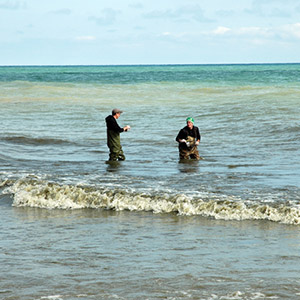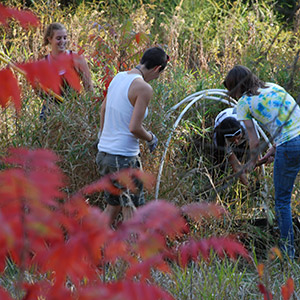There are things you can do about your career before you graduate. The decisions and actions you take early on will have a significant impact on the course of your career life. Now is the time to take stock of your options and make some commitments. The following web resources will help you think through some of the possibilities.
- What Do Environmental Scientists/Conservationists Do?
- Book for Environmental Careers
- Conservation and Environmental Science Career Links



What Do Environmental Scientists/Conservationists Do?
Begin thinking about which career role you would like to have upon graduation and 5 years. The field of Conservation and Environmental Science typically prepares students for a variety of natural resource management career roles, such as (see each described below) academic researcher, non-profit organization staff, consultant for an environmental firm, natural resource agency specialist, or environmental educator (i.e. naturalist or school teacher).
Academia
In academia, you may pursue several career roles, from laboratory technician to research scientist. As a laboratory technician, you will need either a BS or MS. If you choose to be a research scientist or principle investigator, you are likely to need a PhD. Pay varies, depending on your degree. In some cases, you may be responsible for teaching in addition to your research, and you could be expected to find funding for your projects.
Non-profit Organizations
Non-profit organizations have the freedom to work on projects they believe in, as long as they can find funding for those projects. Non-profits serve the public interest and are tax-exempt; the public makes donations to these organizations and expect to deduct them from their federal taxes. People who work for nonprofit organizations expect to make less money but tend to have a higher level of career satisfaction. Environmental education is a growing field within the non-profit arena.
Environmental Consulting
In the private sector, environmental consulting firms hire biologists, ecologists, and environmental scientists to complete biotic assessments and inventories, include ecosystem concerns in land planning at multiple scales, and assess the impact of proposed developments on natural ecosystems. The consulting arena is a fast-paced environment, where staff may juggle several projects simultaneously. Pay is typically higher in consulting firms than in the academic or agency arenas, but work schedules may be very demanding.
Environmental Education
The environmental education career path includes those working as naturalists, recreation program leaders, journalists, interpreters, community outreach specialists, environmental communications specialists at private firms and industries, tour guides, and classroom teachers. Examples of employing organizations are nature centers or museums; local, state or federal parks and monuments; camps; outdoor adventure centers; public utility corporations; environmental advocacy groups such as the Audubon Society, and schools.
Government State, Local, or Federal Agency
The public sector is a dominant employer, from well-known agencies such as the National Park Service to the smallest local land conservation or water district. State, local, and federal environmental and conservation agencies are also prime movers in the development of new policy directions for environmental problem solving. Well-known federal government agencies include the following: National Park Service, Bureau of Land Management, Fish and Wildlife Service; U.S. Geological Survey; Environmental Protection Agency, and the USDA Forest Service. The Wisconsin Department of Natural Resources is the state environmental agency. Local agencies include the Southeastern Wisconsin Regional Planning Commission, the Milwaukee Metropolitan Sewerage District, and offices within city government.
Book for Environmental Careers
Deciding which Environmental Career attracts you? The Environmental Careers Organization’s (ECO’s) book, The Complete Guide to Environmental Careers in the 21st Century, concisely describes a wide variety of conservation and environmental science careers. CES majors, interested students, and alumni can look through the printed version at the CES Program Coordinator’s office, Lapham Hall, Room 364 (South Wing).
Conservation and Environmental Science Career Links
Students investigating environmental and conservation job careers often begin their job search online. Some students become discouraged because of the overwhelming number of environmental job seeking websites available to them. The following is an abbreviated list of sites previous students have found useful. The CES Program Coordinator maintains an expanded list of career internet links; please request this expanded list by email at young3@uwm.edu or in person at Lapham Hall, Room 364 (South Wing).
General Environmental Job Posting Websites
- Listserv of the Ecological Society of America — If you want to keep a pulse of ecological jobs, read the archives or subscribe.
- Environmental Careers Organization — ECO strives to develop leaders, promote careers, and inspire individual action through internships, career advice, career products, research and consulting.
- Environmental Career Opportunities — Provides environmental job listings through free online searches or through a paid subscription. The paid subscription provides job seekers with biweekly issues at a password protected site.
- National Council for Science and the Environment — NCSE offers internet, policy and program internships during the summer and throughout the academic year.
- Society of Conservation Biology — SCB maintains an online database of job postings, education resources, conservation biology tips, bulletin board and contact system.
- EcoEmploy.com — Formerly “E Jobs,” this website provides links to government, corporate, and nonprofit employers in the environmental sector by state and province. Besides general job postings, one can search alphabetical lists of environmental companies, laboratories, law firms, non-profits, and state jobs.
- Environmental Career Center — Provides job listings categorized according to entry-, mid- or senior-level.
- Cyber-Sierra — A free job seeking resource that posts employment opportunities in natural resource, general science, watershed, ecology, and environmental disciplines.
UWM Campus Career Resources
- The UWM Career Development Center’s online resources can help you research career options within your major, match careers according to your interests, values, skills, and personality, locate internships, part-time, full-time, or volunteer work, and develop your skills in resume development, interviewing, and salary negotiation. Students and alumni may also visit the Career Development Center in Mellencamp 128; call 414-229-4486 for information.
- The UWM College of Engineering and Applied Science career advising page has many useful career resources targeted for the science fields, from resume and cover letter writing to excelling in “your first year on the job.”
Wisconsin State Government
To find a job in Wisconsin’s state government, search Wisc.Jobs. If you are looking for a position within a specific bureau or department, be sure to also search that department’s website. For example, the Wisconsin Department of Natural Resources (WDNR) maintains listings of job openings on their own page.
Federal Government
- USAJOBS — The United States Jobs Office of Personnel Management provides world-wide openings posted daily.
- Environmental Protection Agency — Regional offices may post additional job openings on the respective regional office home page.
- National Park Service
- Bureau of Land Management
- Fish & Wildlife Service
- Geological Survey
- Forest Service
- Department of Energy
- National Oceanic and Atmospheric Administration
- NOAA Vessel Employment
- USDA Natural Resources Conservation Service
- Army Corps of Engineers